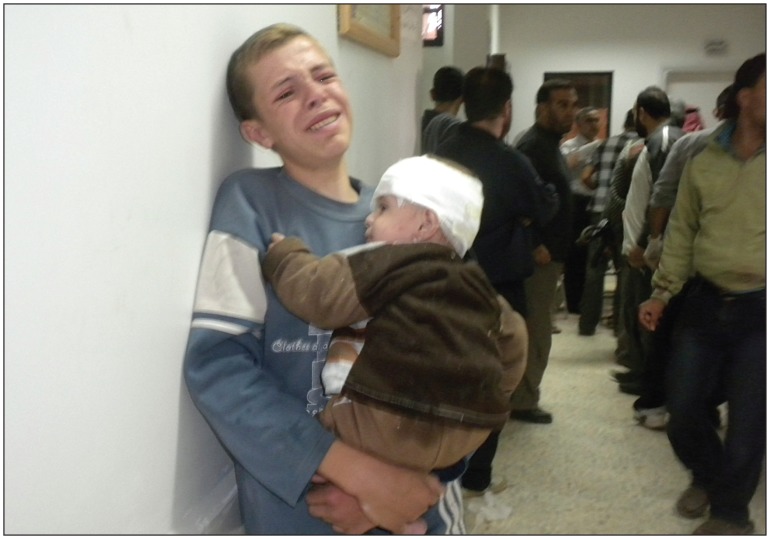At least 130 doctors have been killed and 477 imprisoned during the Syrian Arab Republic’s two-year civil war, which has decimated this former middle-income country’s health care system.
The Damascus-based human rights organization Violation Documentation Center in Syria (www.vdc-sy.org) is documenting the killings and jailings, and provided CMAJ with the figures. The centre reports that 12 of the physicians were tortured to death in prison, 3 were arrested, tortured and then executed in prison and another 12 were executed in the field. About 50 nurses have also been killed.
“We were also able to document 87 field medic persons [executed] when they were doing their job,” centre spokesperson Bassam al-Ahmad told CMAJ in a May 3 email.
“It’s very troubling,” says Stephen Cornish, executive director of Médecins sans Frontières (MSF) Canada, who returned from Syria April 2 following a two-and-a-half week reconnaissance trip. “There’s no respect for [medical] sites or personnel. There needs to be international attention.”
Syrian authorities say 57% of public hospitals have been damaged and 36% are no longer functional, according to the March MSF report Syria Two Years On: The Failure of International Aid So Far. Makeshift hospitals close to conflict zones have been set up in caves, residences, farms and underground bunkers, say MSF staff. Because of the violence, few journalists or other nongovernmental organizations are documenting damage on the ground.
Dr. K, a surgeon in a 30-bed private hospital in northwest Syria, spoke to MSF on condition of anonymity for the MSF report. “The army has been targeting the hospital,” he said. Twice last year, the army took over the city, which cannot be named for security reasons. “When they came, I had to leave because they arrest doctors who treat the wounded. For them, doctors are as good as terrorists. … I’ve had multiple threats but I’ve managed to escape so far because I’ve had friends who warned me.”
A boy carries his injured brother at a makeshift hospital near Homs. A reported 57% of public hospitals have been damaged and 36% are no longer functional.
Image courtesy of Reuters/Muhammad Al-Helawi/Shaam News
Both MSF and the International Committee of the Red Cross say clinics and hospitals are being deliberately bombed, while medical personnel are arrested, harassed or killed.
“Providing medical care was transformed into an act of resistance, a crime, and medical structures became military targets,” MSF writes in the Syria report that describes the “failure of international aid.” “Doctors risk being labeled ‘enemies of the regime’ for treating the injured, which could lead to their arrest, imprisonment, torture or even death.”
Under international humanitarian law, parties to a conflict must respect and protect health care personnel and hospitals, transports and other medical units in all circumstances.
An independent commission of the United Nations Human Rights Council says it’s time the International Criminal Court prosecuted these war crimes — the targeting of medical facilities and the killing and imprisonment of medical personnel.
“We’re saying it’s time for justice,” Carla Del Ponte, a commissioner with the International Commission of Inquiry on the Syrian Arab Republic, told a March 11 news conference. “And we suggest [the International Criminal Court] take action.”
The independent commission (www.ohchr.org/Documents/HRBodies/HRCouncil/CoISyria/PeriodicUpdate11March2013_en.pdf) has also documented deliberate targeting of medical personnel and hospitals. In a March 11 report, the commission found those serving in government hospitals have a “well-founded fear of punishment if they provide treatment to members of anti-Government armed groups.” Meanwhile, staff in government hospitals are afraid of being abducted by opposition groups.
Medical access “has been denied on real or perceived political and sectarian grounds,” the commission says.” In Dara’a, for example, “official hospitals were permitted to treat only members of Government forces and their supporters.”
“One of the most alarming features of the conflict … has been the use of medical care as a tactic of war,” the report states.
The World Medical Association passed an urgent resolution about the doctors’ deaths and imprisonments in April “recommending national medical associations oppose government intrusions into the practice of medicine and in health care decision making…”
The International Committee of the Red Cross, which is working with the Syrian Arab Red Crescent in both government- and opposition-held territories, “remains gravely concerned about the lack of protection for medical services in Syria,” it said in a Mar. 1 release.
The Red Cross reports that much of the country’s infrastructure, including hospitals and other health care facilities, has been damaged. “Dozens of facilities across the country are contending with shortages of equipment, supplies and staff,” Dr. Andrea Reis, who coordinates the Red Cross’s health activities in Syria, said in a news release.
Inevitably, the targeting has led to a shortage of medical personnel. Among those who remain are specialists, residents and surgeons, many of whom have no experience operating on war-related injuries. Dentists who perform minor surgeries, pharmacists who treat patients and young people volunteering as nurses are augmenting the services of the doctors who remain, according to MSF.
Editor’s note: This is the first of a three-part series on Syria.



